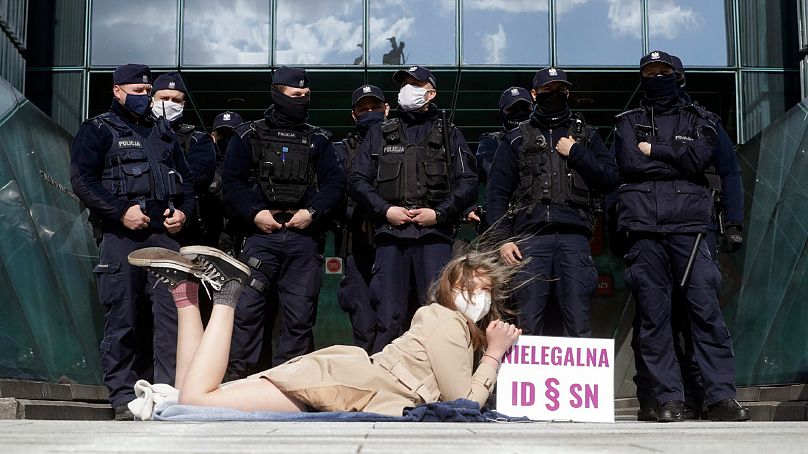Pawel Juszczyszyn says he was suspended from work for questioning the appointment of one judge and insisting that Polish laws obey EU law.
Meet the man who has become a symbol of the fight against judicial reform in Poland.
 ADVERTISEMENT
ADVERTISEMENT
 ADVERTISEMENT
ADVERTISEMENT
Paweł Juszczyszyn, from Olsztyn in the country's north-east, says he's been suspended from being a judge for two years and had a 40% pay cut.
He is among the voices -- which includes EU chiefs in Brussels -- that are concerned that reforms in Poland have put the judiciary under political control.
“There is no judiciary independence anymore,” Juszczyszyn told Euronews."Poland is not a civilised country any longer. In a civilised country, a judge is not punished for his rulings. You can appeal his rulings, but you cannot punish him. But that is what is being done now in Poland, against me and others.”
“But I will not give up,” he added. "The fight for citizens' rights is more important than my own situation.”
He claims the ruling Law and Justice Party control the public prosecutor's office and have politicised the national council responsible for nominating judges.
Reform, he adds, has allowed the disciplinary chamber of Poland's supreme court to be used politically to punish critical judges like himself.
Juszczyszyn says he was suspended in 2019 by a local court for questioning the appointment of one judge and insisting that Polish laws obey EU law. The supreme court's disciplinary chamber later got involved and extended the suspension.
Last year, the European Court of Justice said the disciplinary chamber violated EU laws. It fined Poland €1 million for each day the chamber continues to operate.
The government refuses to comply or pay and says the EU has no say on the justice systems of its 27 members.
The EU is considering freezing the disbursement of Poland’s share of pandemic relief money because of the judicial dispute.
Warsaw insists the reform is necessary to have impartial courts.
“The provisions in the legislation are designed to enhance the credibility of courts," said Poland's president Andrzej Duda.
"They are supposed to reinforce the impartiality of the court, for example, by the fact that judges, as a rule, do not speak out on political matters, they do not express themselves politically. They do not take the side of a political group.”
'Completely compromised'
The institute V-Dem ranked Poland as the country moving fastest towards becoming an authoritarian state. It was before countries like Hungary, Turkey and Brazil.
“States in eastern Europe such as Hungary, Poland, and Serbia have continued their downward decline after continued assaults on the judiciary and restrictions on the media and civil society,” the 2021 report read.
Laurent Pech, a professor of European law at Middlesex University London, has followed developments in Poland closely. He says Poland is moving away from democracy fast and the decline in judicial independence plays a crucial role in this.
“We have seen an acceleration of the process of controlling the courts because the government is afraid of potentially losing the next election in 2023,” said Pech. “They want to capture the courts completely before the next election.
“The rule of law is completely gone at this point. You have a few pockets of resistance from independent judges, but it is only individual resistance. The supreme court has been captured by the government, and while many judges are fighting back, individually and via associations of judges such as Iustitia, structurally speaking, the judicial system has been completely compromised."
Pech says he fears Poland is moving towards being a one-party state and crushing anyone who doesn’t follow their instructions. He branded Juszczyszyn's suspensions as “unprecedented and scandalous” because “the government and its proxies in the judicial system have continued to ignore multiple rulings ordering his reinstatement".
“At this point, I think that the EU should express more strident and unambiguous political criticism, initiate more legal actions and adopt dissuasive financial sanctions to at least make the destruction of the rule of law more costly and slow it down so as give the Polish voters a chance of a free election next year,” he added.
“At that point, it will be for voters, assuming there will be a fair election, which is highly doubtful, to decide whether they want to continue down this pattern."
Euronews has tried to contact the Law and Justice Party to respond to the criticism, but they had not responded by the time of publication.
'Authoritarian state'
In December last year, things suddenly seemed to brighten for Juszczyszyn. A district court ruled in his favour, arguing that the supreme court's disciplinary chamber in Poland did not have the power to suspend him.
Following that ruling, Juszczyszyn returned to work at a regional court in Olsztyn. But his reprieve did not last long: after only four hours at work, he was suspended again.
“This is exactly the problem here in Poland, we have no rule of law,” said Juszczyszyn. “I know now that the only chance that I have to get my job back is for the rule of law to return to Poland. If not, they will continue to stop me no matter what any EU court says.”
Juszczyszyn is keen to point out that there are still good judges working tirelessly to secure impartiality in Poland, making it harder for Europeans to see the flaws of the reform.
“I think that the majority of judges see what is going on,” he said. “If nothing happens, Poland will move on to become an authoritarian state, trying to stop everyone critical such as people working towards human rights and free speech.
“The longer this lasts, the worse and bigger the problem will get. That is the reality.”
As this article was published President Duda said he was going to send a draft law to parliament to try and get the supreme court's disciplinary chamber abolished. Duda is politically aligned with the Law and Justice Party, but it is unclear whether the government would agree to his proposal.
Every weekday, Uncovering Europe brings you a European story that goes beyond the headlines. Download the Euronews app to get a daily alert for this and other breaking news notifications. It's available on Apple and Android devices.












